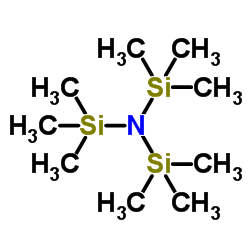1586-73-8
| Name | Tris(trimethylsilyl)amine |
|---|---|
| Synonyms |
1,1,1-Trimethyl-N,N-bis(trimethylsilyl)silanamine
EINECS 216-445-0 MFCD00047990 Tris(trimethylsilyl)amine NONAMETHYLTRISILAZANE |
| Density | 0.8±0.1 g/cm3 |
|---|---|
| Boiling Point | 189.8±0.0 °C at 760 mmHg |
| Melting Point | 65-69 °C |
| Molecular Formula | C9H27NSi3 |
| Molecular Weight | 233.574 |
| Flash Point | 75.9±22.6 °C |
| Exact Mass | 233.145126 |
| PSA | 3.24000 |
| LogP | 3.62 |
| Vapour Pressure | 0.6±0.3 mmHg at 25°C |
| Index of Refraction | 1.419 |
| Storage condition | 2~8°C |
|
Section 1: Product Identification Chemical Name:Nonamethyltrisilazane, 98% CAS Registry Number:1586-73-8 Formula:N[Si(CH3)3]3 EINECS Number:216-445-0 Chemical Family:organosilicon compound Synonym:Tris(trimethylsilyl)amine
Section 2: Composition and Information on Ingredients IngredientCAS NumberPercentACGIH (TWA)OSHA (PEL) Title Compound1586-73-8100%no datano data Section 3: Hazards Identification Irritating to skin, eyes and respiratory tract. Slowly generates ammonia gas in the presence of moisture. Emergency Overview: Symptoms are choking, wheezing, laryngitis, headache, nausea and vomiting. Primary Routes of Exposure:Ingestion, inhalation, skin, eyes. Eye Contact:Irritating to the eyes. May cause burns. Skin Contact:Irritating to skin. May be harmful if absorbed through the skin. Inhalation causes irritation of the respiratory tract. May cause edema and chemical pneumonitis. Inhalation Inhalation: may be fatal. Ingestion:May cause nausea, vomiting and gastrointestinal tract burns, perforation and peritonitis, with abdominal pain. Irritating to skin, eyes and respiratory tract. Ingestion may cause damage to the mouth, throat, esophagus and Acute Health Affects: gastrointestinal tract. Inhalation may be fatal due to edema and chemical pneumonitis. Chronic Health Affects:No information available on long-term chronic effects. NTP:No IARC:No OSHA:No SECTION 4: First Aid Measures Immediately flush the eyes with copious amounts of water for at least 10-15 minutes. A victim may need Eye Exposure: assistance in keeping their eye lids open. Get immediate medical attention. Wash the affected area with water. Remove contaminated clothes if necessary. Seek medical assistance if Skin Exposure: irritation persists. Remove the victim to fresh air. Closely monitor the victim for signs of respiratory problems, such as difficulty Inhalation: in breathing, coughing, wheezing, or pain. In such cases seek immediate medical assistance. Seek medical attention immediately. Keep the victim calm. Give the victim water (only if conscious). Induce Ingestion: vomiting only if directed by medical personnel. SECTION 5: Fire Fighting Measures Flash Point:not applicable Autoignition Temperature:no data Explosion Limits:no data Extinguishing Medium:carbon dioxide or dry powder Fire fighters should be equipped with a NIOSH approved positive pressure self-contained breathing apparatus Special Fire Fighting Procedures: and full protective clothing. Hazardous Combustion andIf involved in a fire, this material may emit toxic and corrosive fumes. Decomposion Products: Unusual Fire or Explosion Hazards: No unusual fire or explosion hazards. SECTION 6: Accidental Release Measures Spill and Leak Procedures:Sweep up the solid and dispose of properly. SECTION 7: Handling and Storage Handling and Storage:Store the material in a sealed container. Keep away from heat and moisture. SECTION 8: Exposure Controls and Personal Protection Eye Protection:Always wear approved safety glasses when handling a chemical substance in the laboratory. Skin Protection:Wear protective clothing and gloves. Consult with glove manufacturer to determine the proper type of glove. Ventilation:Handle the material in an efficient fume hood. If ventilation is not available a respirator should be worn. The use of respirators requires a Respirator Respirator: Protection Program to be in compliance with 29 CFR 1910.134. Ventilation:Handle the material in an efficient fume hood. Additional Protection:No additional protection required. SECTION 9: Physical and Chemical Properties Color and Form:white to colorless waxy solid Molecular Weight:233.6 Melting Point:70-71° Boiling Point:76°C /12 mm Vapor Pressure:no data Specific Gravity:0.8635 Odor:ammonia odor Solubility in Water:insoluble SECTION 10: Stability and Reactivity Stability:air and moisture stable Hazardous Polymerization:no hazardous polymerization Conditions to Avoid:contact with moisture Incompatibility:acids, oxidizing agents and halogens Decomposition Products:carbon dioxide, carbon monoxide, silicon dioxide, nitrogen oxides and organic fumes. SECTION 11: Toxicological Information RTECS Data:No information available in the RTECS files. Carcinogenic Effects:No data available Mutagenic Effects:No data available Tetratogenic Effects:No data available SECTION 12: Ecological Information Ecological Information:No information available SECTION 13: Disposal Considerations Disposal:Dispose of according to federal, state, and local regulations. SECTION 14: Transportation Shipping Name (CFR):Non-hazardous Hazard Class (CFR):NA Additional Hazard Class (CFR):NA Packaging Group (CFR):NA UN ID Number (CFR):NA Shipping Name (IATA):Non-hazardous Hazard Class (IATA):NA Additional Hazard Class (IATA):NA Packaging Group (IATA):NA UN ID Number (IATA):NA SECTION 15: Regulatory Information TSCA:Listed in the TSCA inventory. SARA (Title 313):Title compound not listed. Second Ingredient:none SECTION 16 - ADDITIONAL INFORMATION N/A |
| Hazard Codes | C: Corrosive; |
|---|---|
| Risk Phrases | R34 |
| Safety Phrases | S26-S36/37/39-S45 |
| RIDADR | UN 3259 8/PG 3 |
| WGK Germany | 3 |
| Packaging Group | III |
| Hazard Class | 8 |
| HS Code | 2931900090 |
| HS Code | 2931900090 |
|---|---|
| Summary | 2931900090. other organo-inorganic compounds. VAT:17.0%. Tax rebate rate:13.0%. Supervision conditions:AB(certificate of inspection for goods inward,certificate of inspection for goods outward). MFN tariff:6.5%. General tariff:30.0% |


